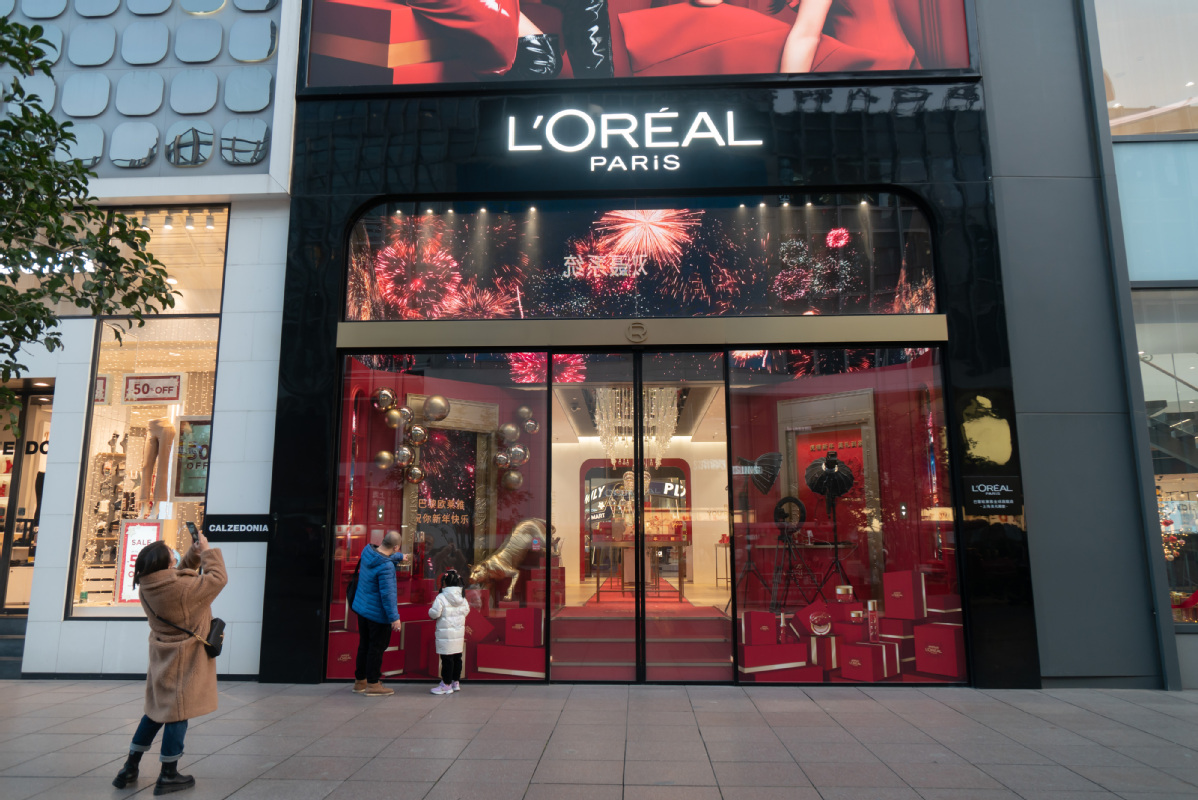Beauty firm to enhance local cooperation for bigger growth

L'Oreal's flagship store in Shanghai. The year 2022 marks the 25th year since the brand's entry into the Chinese market. WANG GANG/FOR CHINA DAILY
Bullish on its Chinese biz, L'Oreal China highlights 'joint creation' in future plans
L'Oreal China said it will focus on joint efforts with partners on brand and product development, beauty technology and ecological protection as it celebrated its 25th anniversary in the country by unveiling a series of strategies for the coming years.
The action plan, emphasizing the importance of joint creation with the local ecosystem, was released on the basis that China has risen to become the beauty giant's second-largest market as it averaged 20 percent year-on-year growth in the past two years despite the shock of the COVID-19 pandemic.
"The Chinese economy has demonstrated strong resilience and potential as always, injecting momentum and vitality into the development of foreign companies in China and world economic recovery," Fabrice Megarbane, president of L'Oreal North Asia and CEO of L'Oreal China, said in a celebratory event last Friday in Shanghai.
"L'Oreal's success in China always witnessed, benefited from and contributed to China's strategy of firmly expanding domestic demand and the decision of opening-up."
L'Oreal unveiled a five-pronged strategy, calling it "co-create, co-empower, co-develop, co-protect and co-invent".
Highlights include encouraging more inclusive, nimble and creative beauty tech, inspiring product and brand innovation with partners and employees alike, and contributing to an eco-friendly system with the efforts of all parties.
In the quarter ended December, L'Oreal China achieved year-on-year growth of more than 50 percent compared with 2019 in pre-COVID days, its latest earnings report said.
L'Oreal's North Asia zone, which is based in Shanghai and also encompasses markets like Japan and South Korea, registered a 17.6 percent year-on-year rise in 2021, which slightly surpassed the 16.1 percent increase posted by the entire group.
While growth in the second half of 2021 eased in China, it still represented major growth in absolute terms given China's already sizable market, Megarbane told China Daily in an online interview.
"We still believe the fundamental of the market is there and the beauty market is very resilient," he said. "If you take it on the mid-to-long term, we still see a market which should continue growing at the high single digit, which for the size of the Chinese market, is still very good growth for the future."
The company has spared no effort in advancing China as one of its key growth engines. After recognizing Shanghai in May as its North Asia headquarters, it also aims to form a unique beauty triangle featuring skincare highlights in China, Japan and South Korea, leveraging beauty trends and synergies from those markets.
The company has a track record of infusing technology into skincare products and solutions, hosting a number of local campaigns to attract science talent and foster joint innovation, such as the setup of the L'Oreal Academician Working Station in Shanghai.
On reducing its carbon footprint, the company vowed to manage carbon emissions of supply chains to fight climate change, disclose the environmental and social impact of L'Oreal products to help consumers make sustainable choices and participate in the 2022 China Carbon Neutrality Expo.
The COVID pandemic is likely to bring sweeping changes to the cosmetics industry, from selective choice of colored cosmetics to increasing care for body cleansing, a study by Kantar Worldpanel said.
People's awareness and fondness of environmentally friendly products are clearly on the rise, said Jason Yu, general manager of Kantar Worldpanel China.
"This, alongside continuing education from media and brands about sustainability, means that products with environmentally friendly elements will gain more preference among consumers, which will likely inspire the beauty industry to integrate sustainability into brand strategy, and focus more on products with 'nature' and 'healthy' concepts," he said.


